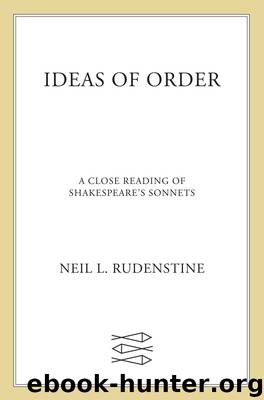Ideas of Order by Neil L. Rudenstine

Author:Neil L. Rudenstine
Language: eng
Format: epub
ISBN: 9780374712013
Publisher: Farrar, Straus and Giroux
SIXTEEN
Hugely Politic
Nearly all of the sonnets from 121 to 125 are among the most declarative and confident in the entire sequence. The poet is seeking to prevail over powerful forces kept at bay by the sheer strength of rhetoric and proclaimed conviction. He is striving, in effect, to achieve an act of self-definition and self-affirmation. Indeed, the main focus in three of these five sonnets is on the poet’s commitment to a mode of constancy that can withstand all that is arrayed against it.
In sonnet 121, he moves to distinguish himself from those who have impugned him through rumor and slander:
For why should others’ false adulterate eyes
Give salutation to my sportive blood?
Or on my frailties why are frailer spies,
Which in their wills count bad what I think good?
No, I am that I am, and they that level
At my abuses reckon up their own;
I may be straight though they themselves be bevel;
By their rank thoughts my deeds must not be shown …
(121)
The poet’s claim is not that he is free of faults—his “blood” is “sportive,” he has “frailties,” he is associated with “abuses,” and—far from impeccable—he suggests that he “may be straight” but is not necessarily so. He claims only a degree of virtue that the “vile” (line 1) do not possess, distancing himself from the false accusations of those who despise him, who view him as an outcast, and who “brand” his name. “I am that I am” is a statement of self-vindication as well as one of confession. It sets the stage for the following poems, which stress his capacity to place himself outside the realms of “policy,” of “thrivers,” of slanderers and “informers,” and—for the term of life—outside Time itself.
Sonnet 123 insists that Time will never be able to “boast that I do change”: “I will be true despite thy scythe and thee.” And these assurances lead directly to the very great sonnet 124:
If my dear love were but the child of state,
It might for Fortune’s bastard be unfathered,
As subject to Time’s love, or to Time’s hate,
Weeds among weeds, or flowers with flowers gathered.
No, it was builded far from accident;
It suffers not in smiling pomp, nor falls
Under the blow of thralled discontent,
Whereto th’inviting time our fashion calls.
It fears not Policy, that heretic,
Which works on leases of short-numb’red hours,
But all alone stands hugely politic,
That it nor grows with heat, nor drowns with show’rs.
To this I witness call the fools of Time,
Which die for goodness, who have lived for crime.
(124)
Love is now the ruling power, no longer subject to Time’s “accidents” or to the rewards that Fortune might bestow. The reference to Time links the poem to 123, but there is also an obvious shift in emphasis from Time to Fortune—to the hazards of social and political existence, dominated essentially by the unpredictable turnings of Fortune’s wheel. Because the poet’s abiding love is said to have been nourished far from the world of intrigue—“smiling pomp” and “thralled discontent”—it is simply not subject to their whims. It is also removed from
Download
This site does not store any files on its server. We only index and link to content provided by other sites. Please contact the content providers to delete copyright contents if any and email us, we'll remove relevant links or contents immediately.
| Ancient & Classical | Arthurian Romance |
| Beat Generation | Feminist |
| Gothic & Romantic | LGBT |
| Medieval | Modern |
| Modernism | Postmodernism |
| Renaissance | Shakespeare |
| Surrealism | Victorian |
4 3 2 1: A Novel by Paul Auster(11035)
The handmaid's tale by Margaret Atwood(6839)
Giovanni's Room by James Baldwin(5873)
Big Magic: Creative Living Beyond Fear by Elizabeth Gilbert(4719)
Asking the Right Questions: A Guide to Critical Thinking by M. Neil Browne & Stuart M. Keeley(4567)
On Writing A Memoir of the Craft by Stephen King(4206)
Ego Is the Enemy by Ryan Holiday(3983)
Ken Follett - World without end by Ken Follett(3968)
The Body: A Guide for Occupants by Bill Bryson(3791)
Bluets by Maggie Nelson(3705)
Adulting by Kelly Williams Brown(3663)
Guilty Pleasures by Laurell K Hamilton(3578)
Eat That Frog! by Brian Tracy(3509)
White Noise - A Novel by Don DeLillo(3430)
The Poetry of Pablo Neruda by Pablo Neruda(3358)
Alive: The Story of the Andes Survivors by Piers Paul Read(3304)
The Bookshop by Penelope Fitzgerald(3222)
The Book of Joy by Dalai Lama(3212)
Fingerprints of the Gods by Graham Hancock(3207)
